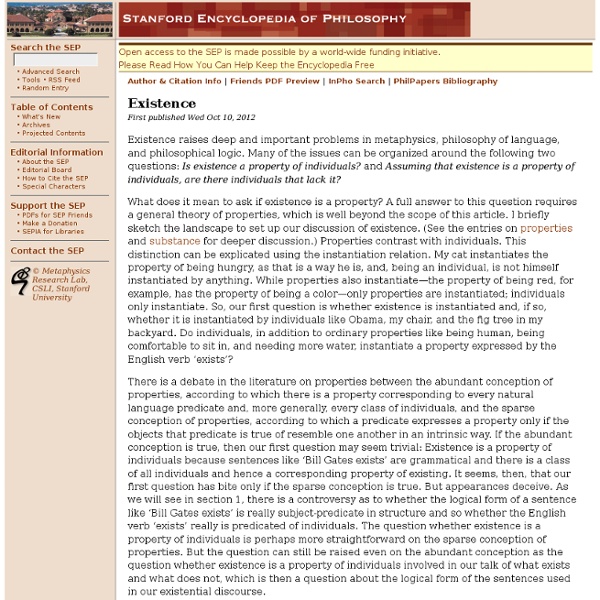60 Small Ways to Improve Your Life in the Next 100 Days
Contrary to popular belief, you don’t have to make drastic changes in order to notice an improvement in the quality of your life. At the same time, you don’t need to wait a long time in order to see the measurable results that come from taking positive action. All you have to do is take small steps, and take them consistently, for a period of 100 days. Below you’ll find 60 small ways to improve all areas of your life in the next 100 days. Home
Platos "The Allegory of the Cave": A Summary - StumbleUpon
"In fact, you get pretty good at understanding how the patterns in the show work, and everyone else chained up is like, 'Holy shit bro, how did you know that that tree was going to fall on that guy?' and you're like, 'It's because I fucking pay attention and I'm smart as shit.' You're the smartest of the chained, and they all revere you."
Friedrich Nietzsche (Stanford Encyclopedia of Philosophy) - StumbleUpon
1. Life: 1844–1900 In the small German village of Röcken bei Lützen, located in a rural farmland area southwest of Leipzig, Friedrich Wilhelm Nietzsche was born at approximately 10:00 a.m. on October 15, 1844. The date coincided with the 49th birthday of the Prussian King, Friedrich Wilhelm IV, after whom Nietzsche was named, and who had been responsible for Nietzsche's father's appointment as Röcken's town minister.
Books that will induce a mindfuck
Here is the list of books that will officially induce mindfucks, sorted alphabetically by author. Those authors in bold have been recommended by one or more people as being generally mindfucking - any books listed under their names are particularly odd. You're welcome to /msg me to make an addition to this list.
Symptoms You Shouldn't Ignore
3. SHARP PAIN IN THE ABDOMENWhat it feels like: All the metaphors apply—knife in the gut, bullet in the belly, skewer in the stomach—except this attack is from within. What it could be: Since the area between your ribs and your hips is jam-packed with organs, the pain can be a symptom of either appendicitis, pancreatitis, or an inflamed gallbladder. In all three cases, the cause is the same: Something has blocked up the organ in question, resulting in a potentially fatal infection. How to fix it: If the pain is in your lower-right abdomen and your white-blood-cell count is up, says Dr.
40 Belief-Shaking Remarks From a Ruthless Nonconformist
If there’s one thing Friedrich Nietzsche did well, it’s obliterate feel-good beliefs people have about themselves. He has been criticized for being a misanthrope, a subvert, a cynic and a pessimist, but I think these assessments are off the mark. I believe he only wanted human beings to be more honest with themselves. He did have a remarkable gift for aphorism — he once declared, “It is my ambition to say in ten sentences what others say in a whole book.” A hundred years after his death, Nietzsche retains his disturbing talent for turning a person’s worldview upside-down with one jarring remark.
axioms - StumbleUpon
Contents Contents | rgb Home | Philosophy Home | Axioms | Other Books by rgb: | The Book of Lilith | Axioms is a work that explores the true nature of human knowledge, in particular the fundamental nature of deductive and inductive reasoning. It begins by embracing Hume's Skepticism and Descartes' one ``certain'' thing, and then looking for a way out of the solipsistic hell this leaves one in in terms of ``certain'' knowledge.
The Bitch is Back: Books: GQ
goddamn, the experience of being 19 years old and reading Ayn Rand! The crystal-shivering-at-the-breaking-pitch intensity of it! Not just for that 19-year-old, but for everybody unfortunate enough to be caught in his psychic blast radius. Is "experience" even the right word for The Fountainhead and Atlas Shrugged? Ayn Rand's idolization of Mickey Spillane and cigarettes and capitalism—an experience?
"How to Write a Paper at the Last Minute (Also Known As: The Procrastinator's Guide to BS-ing an Essay)" by Jessica L
Let's face it: we've all been there. It's 9 p.m. on a Sunday night, and you have a 15-page research paper due tomorrow that you have barely started. You've had a month to do it, but somehow, all you've managed is to check out a few books from the library and jot down a working thesis. You've checked Facebook, Twitter, MySpace, FMyLife, PerezHilton, and CollegeHumor (obviously) each about a million times, and now you're finally left staring at a blank Microsoft Word document, a cold dread settling into your stomach. So what now? Take it from a veteran procrastinator: all hope is not lost.
The World As I See It - StumbleUpon
"How strange is the lot of us mortals! Each of us is here for a brief sojourn; for what purpose he knows not, though he sometimes thinks he senses it. But without deeper reflection one knows from daily life that one exists for other people -- first of all for those upon whose smiles and well-being our own happiness is wholly dependent, and then for the many, unknown to us, to whose destinies we are bound by the ties of sympathy.
The Analysis of mind, by Bertrand Russell.
Russell, Bertrand, 1872-1970. . The Analysis of mind, by Bertrand Russell. Electronic Text Center, University of Virginia Library
Memory Improvement Techniques - Improve Your Memory with MindTools
© VeerPRZEMYSLAW PRZYBYLSKI Use these techniques to improve your memory. The tools in this section help you to improve your memory. They help you both to remember facts accurately and to remember the structure of information.



